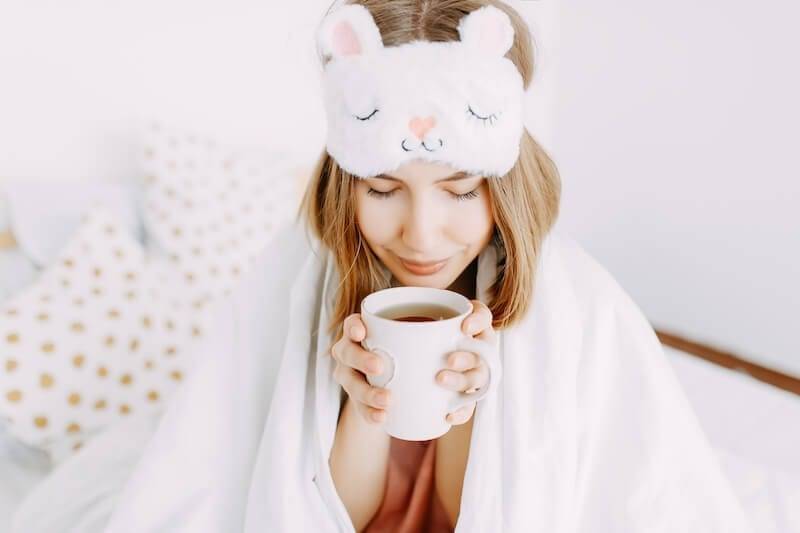Let's say it's a typical weekday, and you wake up feeling exhausted with a throbbing headache. Your eyes are sunken, and your deep circles are showing. You find yourself getting so cranky every morning, and coffee is your best friend. Without coffee, you can't stay awake.
Does this sound like you?
If yes, then you could be suffering from sleep deprivation or a chronic sleep disorder.
Anxiety, stress, and overthinking are three of the most leading causes of insomnia. A study in 2019 reveals that more than 50 per cent of Australian men and women suffer from at least one chronic sleep symptom. This number may have significantly increased over this year with the pandemic going on.
Sleep experts advise us to develop good sleep hygiene to combat insomnia. But what is sleep hygiene? In essence, it refers to the healthy sleep habits of a person. These are strategies that can be implemented to improve a person's sleep significantly. Although many other medications can treat insomnia, these drugs can only improve your sleep for a shorter period. Healthy sleeping habits are proven to be far more effective and long-lasting.
Both men and women are creatures of habit. We may not realize how these habits govern our everyday lives.
Here are some nifty tricks to improve your sleep habits and escape yet another long, sleepless night:
Reserve your bed for sleeping
Avoid using your bed for daytime activities like work, school requirements, and other unrelated stuff to relaxation and sleep. Don't go to bed unless you're feeling drowsy. This way, you're helping your mind and body to associate your bed with sleep alone.
Try to go to bed simultaneously every night instead of spending countless hours of tossing and turning on your side. Having a regular sleeping schedule can help reset your body clock and can improve your sleep-wake cycle.
Don't stay in bed, awake for more than 10-20 minutes. Get out of bed if you're finding it difficult to sleep and get back once the drowsiness starts to kick in.
Lights Off
Melatonin is a natural substance in the body produced in high amounts by our brain during nighttime. It's known as the 'sleep hormone' because it is responsible for your circadian rhythm. This so-called circadian rhythm, or body-clock in layman's term, regulates our sleep patterns.
Although melatonin can be taken as a supplement, there are ways on how to induce them naturally. Turning off the lights and reducing your screen time at night can certainly improve your sleep. Exposure to blue light during bedtime can stunt melatonin hormones, thus making you less sleepy and more awake. The logic behind this is that whenever your brain senses light, it's tricked into thinking that it's still daytime.
Make sure to keep your bedroom cool and dark for a calming bedtime experience.
Other natural ways to boost your melatonin production:
- Use a weighted blanket
- Eat melatonin-rich foods like nuts and grains
- Increase exposure to sunlight during daytime
Journal your thoughts
These thoughts sitting at the back of your head, usually arise whenever you're laying in bed with nothing to do. It sucks to have them circling inside your head again and again. This is where journaling comes in handy. It can help you achieve mindfulness. A sleep diary or a gratitude journal has been proven to reduce anxiety and stress.
Write your worries down on paper instead of letting them consume you. Take some "me time" to reflect on your thoughts after jotting them down. As you keep track of your current and previous entries, this allows you to become more self-aware of your thoughts and ideas. Journaling is a simple yet effective way to stay grounded or present at the moment.
You don't have to be a writer to start journaling. You can start by allocating 15 minutes of your bedtime to this. A gratitude journal is said to be more rewarding, but you can also write down what is bothering you if you wish.
Other benefits of journaling include:
- Improving your mood
- Recognizing your triggers
- Identifying negative thinking patterns
- Exercising positive self-talk
Have a bedtime ritual or a fixed nighttime routine
A powerful bedtime ritual should get you in the mood to sleep, but it's even more powerful when you do them with consistency. As mentioned earlier, humans are creatures of habit.
You can meditate. Do breathing exercises. Pray. Take a hot shower. Apply an overnight facemask. Read a good book, or listen to a podcast! Do whatever you want to help you destress after a long day.
Remember that your bedtime is a time that's dedicated to relaxation and peace. You owe this to yourself. The day has finally come to an end, and tomorrow is another day. Now is the time for you to take your beauty rest. Relax and nourish your soul. You deserve this!
Going to bed at the same time every day also does the trick. Consistency is key in building new habits. Your internal clock will eventually pick up on your sleeping pattern, and you'll be falling asleep faster than before.
Have some tea for sleep
Let your body unwind after a long, gruelling day. Take sips of tea for insomnia while reading a book, journaling, or listening to music.
Our relaxing herbal tea blends will help you slip away into oblivion. The best tea for sleep is infused with healthy and organic ingredients, just like our collection. You won't be able to resist the intense aroma of rose petals and lavender wafting through the air and into your nostrils.
These are some of the benefits of our herbal tea for sleep:
- Gives a feeling of refreshment
- Calms your nerves
- Increases drowsiness
- Increases sleeping time, and
- Improves overall sleep quality
Take a warm cup of tea by your bedside and enjoy the soothing sensation with each sip. Drink our organic tea concoctions a few hours before going to bed to fall asleep in no time.
We have tea blends specifically for sleep and also for calmness. They contain rose petals, chamomile, lavender, hops, ashwagandha, passionflower, and peppermint, to name a few.
Avoid taking long naps throughout the day
It's very tempting to take a nap during the afternoon, and that's fine! But do you know how long it should be? Studies show that an ideal nap should be around 20 minutes and should not exceed 30 minutes. Power naps work best for most adults, and they've been proven to boost brain functions.
If you take extended nap hours, your brain will become more active at night. This is a bad habit that ruins the sleep cycle so try to avoid it as much as you can.
Napping for more extended periods increases your chances of falling into a deep sleep and waking up feeling groggy instead of refreshed.
Exercise regularly
So you might ask, "how does regular exercise affect my sleep?"
Morning or afternoon exercise, in particular, can result in increased body temperature. Our body temperature drops post-exercise, which promotes drowsiness and a calming sensation to the body.
Exercise can also improve your mood by releasing endorphins in the body. These endorphins are the so-called "feel-good" hormones, and they're said to reduce anxiety and stress.
Although regular exercise is excellent, try to avoid strenuous activities at least 4 hours before bedtime to prevent getting your sleep interrupted. Exercise increases the heart rate and stimulates the nerves. This can make you feel restless as opposed to feeling relaxed in the evening.
Conclusion
Having a good night's sleep is an essential component of a person's general health. Getting adequate sleep has many benefits. It can boost your immune system, improve your mood, and increase brain function, among many other things.
The habits that we form over time, including our sleeping habits, can affect our day-to-day activities at large. An individual with healthy sleep hygiene or habits can sleep better than a person with poor sleep hygiene.
To recap briefly, we've mentioned some tips on how to improve your sleep hygiene:
- As much as possible, use your bed for sleeping only.
- Turn off the lights during bedtime to induce melatonin production.
- Have a fixed nighttime routine, like reading a book, etc. Try to go to bed at a fixed time every day.
- Drink some tea that helps you sleep.
- Don't nap for too long.
- Exercise regularly, preferably in the morning or in the afternoon.
And lastly, don't be discouraged if these tips don't work for you right away. All good things take time, so be patient and be consistent. It's a good investment to develop these healthy habits early on.
Health is wealth, and a person can't be healthy without a good night's sleep. Apply these simple tricks during your bedtime so you can finally snooze your worries away and say goodbye to sleepless nights!


